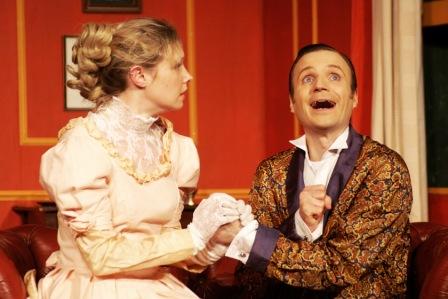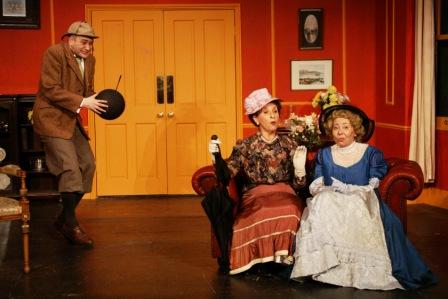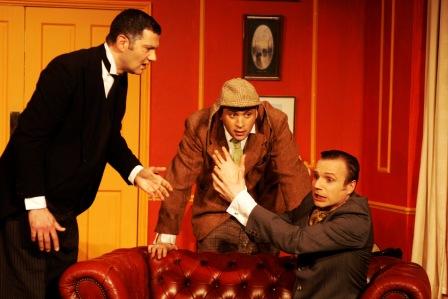|
|
||||||||||||||||||||||||||||||||||||||||||||||||||||||||||||||||||||||||||||||||||||||||||
Click
here for more pictures of this play |
||||||||||||||||||||||||||||||||||||||||||||||||||||||||||||||||||||||||||||||||||||||||||
|
||||||||||||||||||||||||||||||||||||||||||||||||||||||||||||||||||||||||||||||||||||||||||
|
Click here for the
NODA crit for this play |
||||||||||||||||||||||||||||||||||||||||||||||||||||||||||||||||||||||||||||||||||||||||||
|
Allow me first of all to thank you for inviting me to provide a critique of your production of “Lord Arthur Savile’s Crime”, which I saw on Thursday. The Play To deal with the play first: I appreciate that you cannot do anything about the script, but you chose the play and have to account for that choice. I am not familiar with the work of Constance Cox, though given that she was such a prolific adapter of classic works, I have probably seen things that she has done without realising it. The play is from a short story by Oscar Wilde, and Cox leans heavily on Wilde’s other dramatic work. This is either an acknowledgement of her debt to him, or shameless plagiarism, depending on your point of view. There are all sorts of references to “The Importance of Being Earnest” I wasn’t sure whether or not to expect a sort of “Oscar Wilde-lite”, but in fact “Lord Arthur Savile’s Crime” lacks any of Wilde’s coruscating wit. The characters are very much drawn from “stock” – Jeeves and Wooster spring to mind, with Wodehouse’s roll-call of Aunts, some good, some ghastly, but again without the leavening power of P G Wodehouse’s wit. I took the opportunity to read Wilde’s original short story, which is actually quite “dark”, somewhat in the mood of his “The Picture of Dorian Gray” (from whence comes the character of Sybil?), but out of a slightly macabre short story Constance Cox has produced what I can only describe as a piece of fluff – a ludicrous plot in which neither Lord Arthur, Sybil, Baines or Herr Winkelkopf seem to think there is anything wrong in murdering Arthur’s relatives. The nonsensical plot led to a problem in the playing of the piece, which I will deal with when I come to discuss the individual characters. Suffice to say that as a company you were not well served by your script on this occasion. The set Your set provided a very positive first impression: solid, with a perfect colour scheme and good furniture, though I wasn’t quite sure about the bookcase thingummy USR, which didn’t quite fit in with the rest. The double doors looked the part and were very well handled by Baines, though they did have a tendency to swing open by themselves if not shut properly, and the cast needed to pay more attention to their exits in this regard. Overall, an excellent set which does credit both to your designers and builders. Lighting Not much to say about this. The only distinction that I could spot was between the evening and morning scenes when the light was brighter. I wanted to see whether you had “natural” light flooding through the curtains at SL in the daytime scenes, but unfortunately I was seated at the far right of the auditorium and couldn’t tell whether you had done this or not. Generally the characters were well lit, which is really all the audience want in a piece like this, so well done to your lighting team. Sound Again there is not much to say about a very limited FX plot. I thought the knocking sounded a bit feeble, and didn’t give the effect of a substantial front door, but the explosions worked well. I think your operator was a bit quick off the mark when the umbrella was thrown out of the window. You could have made a nice “moment” if Arthur had thrown the umbrella out and then turned to the others with a self-satisfied smile before the explosion rocked him. As it was, the brolly had barely made it over the window ledge before it blew up. You may have corrected this problem by the Friday night. The incidental music was good. I don’t know whether it was actually from the 1890’s – the piece covering the second scene change sounded a bit jazzy to me – but whether it was of the period or not, the music fitted the play well and was a good choice. Costumes The costumes generally were a great success and my compliments to your costume department who dressed the actors superbly throughout. I wasn’t entirely convinced about Lady Clem’s first outfit, but generally speaking any disquiet I felt was less to do with the costumes and more to do with the actors wearing them. It is important to remember as an actor, that what you put on as a costume you should wear as your clothes. Sybil, for example, seemed uncomfortable in the long gloves she was wearing in the first scene, though this may have had more to do with first night nerves! Overall, this was superbly dressed, and I can’t compliment you enough for making the play look as good as it did. Props/Stage Management etc. There is further credit to your props team for sourcing such a volume of period props, but also credit to the actors for handling them all so professionally. The stage management was good, though I hate, loathe and detest scene changes, which break the mood and can never be too short for my money. I couldn’t work out what had altered between the scenes, and as far as I could see the scene changes only really served to allow the actors to change clothes, and therefore every effort should have been made to keep them as short as possible. Direction All credit to your director for all the points outlined above. The general staging was excellent, with the actors well positioned, though you occasionally had the butler just squeezed in above the DSR armchair which looked a bit odd. There was some playing upstage, for example Sybil in the first Act, but overall your attention to mise en scène was very good and some elegant “pictures” were created. The pacing of the play was first class, with entrances and exits timely and, with the exception of the problems with the double doors, well executed. The lines were delivered with complete clarity and the story was well told. The only real issue I had with the storytelling was the poisoning scene in Act 2 Sc 1, where it wasn’t quite clear whether Arthur realised that the poison had been placed in the port. I had read the script beforehand, so I knew what to expect, but I am not sure that the audience generally realised what was going on. This was something that had to be carefully “pointed”, so that when he drinks the port the audience all know that he is going to poison himself, while he himself is blissfully unaware of the fact. My one criticism of the direction is to do with how some of the actors played the piece. I felt that some of the actors were guilty of “overplaying”, while the rest maintained discipline and remained entirely in character. I am a long way from suggesting that your people “hammed” this production, but there is a certain self-awareness that comes across - an awareness if you like of quite how ludicrous the script is - which some of the actors failed to quell, and I shall talk more about this when I discuss the individual performances. I think the role of the director in such circumstances is to bring all the actors into line and to ensure that they are all singing from the same hymn sheet. Actors: Baines To my mind this was the outstanding performance in the play and the glue that held the whole thing together. Howard was disciplined, assured and entirely convincing. I think I might have wanted a little more emotion where the script calls for it, particularly when he says that he will retire rather than work for another master, but when I am critical of others for overplaying, I cannot criticise Howard for a beautifully restrained performance. Very well done. Lord Arthur This is very much the part that sets the tone for the play; a huge role where the actor is rarely off stage and which calls for a performance of considerable energy and drive. Spencer delivered this, and I congratulate him for his performance. His stage presence is excellent and his diction and general delivery nearly faultless. There was a dodgy moment in his first scene with Sybil when the words went a bit skew-whiff, but they managed to dig themselves out and recover their poise. An example of first night nerves, perhaps. I like working with “big” actors. With a “big” actor you can always rein them in to get them to the appropriate level. I think Spencer could have done with a bit of reining in. It’s not that he hammed up the part, rather that he didn’t quite believe in his situation, and so it becomes impossible for the audience to believe in it either. In this, of course, you were not aided by the script, and I think allowance has to be made there. Sybil Sybil fell into the same trap as Lord Arthur. Sophie is obviously an actress of considerable talent. You looked gorgeous, and we could quite see how Arthur had fallen in love with you, despite your mother. But when, for example, the script called for tears, what we got was you acting at pretending to cry, when what the part called for in my view was real tears. It is a fine point, and I don’t know whether it was a directorial point or one that you came up with yourself, but the difference between the two is such as to suggest to the audience that you don’t really believe in the situation in which you find yourself. I accept that this is a matter of interpretation or even of personal choice, but I think the play would have been funnier if both Sybil and Lord Arthur had been played entirely “straight”. The Dean I always enjoy watching Foster on stage and this was no exception. Having read the script I was expecting something more bumbling and perhaps gentler – think Mr Godfrey from Dad’s Army –but what Foster gave us was nonetheless delightful, a properly drawn character delivered with his customary verve and clarity. Well done. Lady Windermere Lady W is a far more important character in the short story, but is reduced to a less central role here. Sylvia gave us a beautifully presented character, played with excellent diction and stage presence. Although she didn’t have a great deal to do, we entirely accepted her outrage at Lady Julia in the first scene and she particularly came into her own in Act 3 Sc 1 with the story of the non-exploding clock. Well played. Lady Clem With respect to Lisa, I was expecting a much older woman. Given that Arthur is nearly thirty and Aunt Clem is his great-aunt, I assumed she was pushing eighty. Nonetheless, what Lisa gave us was a delightful Auntie, who we entirely believed with all her weaknesses and ailments. This was an assured performance, delivered with great poise and plausibility. My congratulations. Lady Julia This is a rather thankless part. The playwright wants us to believe that Lady Julia is an alter ego of Lady Bracknell from “The Importance of Being Earnest”. However, the brilliance of Wilde’s characterisation of his Grande Dame is not matched by Constance Cox, who gives Lady Julia virtually nothing with which to work, apart from the above-mentioned stolen line from Algernon. The result is a character devoid of charm and wit, and in the circumstances Karen did her best to make Lady Julia as believable as she did. There was a certain swallowing of words in the third act, which was the only occasion in the whole play when it wasn’t clear to me what someone had said, but she recovered herself and deserves credit for making such a strong character out of such poor material. Mr Podgers I have not seen Iain work before but thought that he did an excellent job with Mr Podgers. He looked exactly as the part required and was suitable “oily”. The transformation in the blackmail scene was particularly well handled. Mr Podgers is one of the better drawn characters in the play and perhaps crucially one of the few characters where Ms Cox was true to the short story, both in terms of character and dialogue. I very much enjoyed this performance and congratulate Iain for his portrayal. Nellie A lovely performance from Jean, who made an entirely convincing character come to life. Your shyness on being confronted with his Lordship came across perfectly, as did your developing admiration for Mr Baines. A really enjoyable performance that the whole audience would have liked more of! Herr Winkelkopf I wasn’t entirely convinced by Winkelkopf, but to be fair to Jon I think this was more to do with the script rather than with his performance. It might well be impossible to do anything with this ridiculous character other than overplay him, but I felt that you didn’t help yourself by falling into the classic trap of the cartoon German, with the ludicrous accent, the clicking of the heels etc. You might have made this work better by just making him eccentric and de-emphasising the cartoon German. Nonetheless you had a good stage presence and your diction was good – I got every word despite the accent. Also your handling of the props was excellent, and I don’t belittle how difficult a skill that is. In summary I think what comes through on re-reading my notes is that a lot of my criticisms stem from the shortcomings of the script. I think you can poke fun at real people and make it funny (and this is Oscar Wilde’s enduring appeal), but I don’t think you can draw caricatures of real people and poke fun at them. I also think that as a company you are better than this. In fact, I know you are – I have seen you demonstrate it on many occasions. In your defence I suppose that we can say that this play fits the definition of “potboiler”, and we know that “potboiler” means bums on seats. As an old friend of mine always says “that’s not to be sniffed at”! If bums on seats were the sole criterion then the play was clearly a success. There was a very good house on the Thursday (85-90%?), and presumably you did just as well on the Friday and Saturday. I also think, despite my curmudgeonly remarks and dim view of the script, that the play was a success on many other levels as well. The audience clearly enjoyed it and the piece allowed the company to demonstrate the breadth of its range, so very well done all round. I hope that you will accept my criticisms in the positive spirit in which they are intended. More power to your collective elbows and I wish you all every success for future production. Viva LADS! |
||||||||||||||||||||||||||||||||||||||||||||||||||||||||||||||||||||||||||||||||||||||||||



